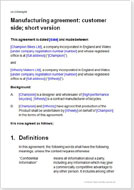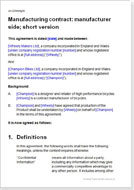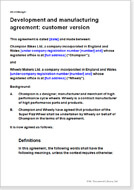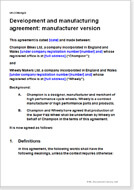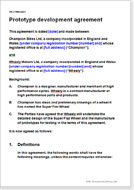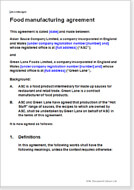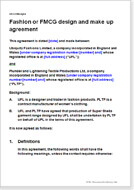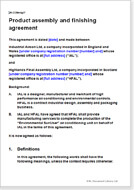Manufacturing agreements
These are contracts for the customer or client to have goods manufactured to specification. Some documents additionally cover other services that the manufacturer might provide such as prototyping, development, finishing, assembly and packing.
These documents are suitable for a range of products and circumstances including manufacture abroad.
Manufacturing agreement: customer side, short version
This manufacturing agreement is for use by any business to order the manufacture of any product.
The contract does not provide for the manufacturer to provide additional services such as conversion of designs or assembly of multiple components. The manufacturer simply makes the product for you.
The agreement contains many small points that protect the client’s interests: from stringent testing, to showing the factory to your own customers, to prevention of change of control of their business.
The agreement includes internationally recognised Incoterms for delivery and is suitable for use if your manufacturer is located outside the UK.
The document could be used for a single production run, or as an umbrella contract for multiple or continuing orders.
Manufacturing contract: manufacturer side, short version
This is a standard manufacturing agreement that covers an arrangement solely for manufacture, and not for additional services such as design or finishing.
Your arrangement may be a subcontract for production of a part for which you do not have the facilities to manufacture yourself, or you may just not need an agreement that covers additional services.
Although a short contract, it is still a very thorough document. In particular, it covers protection of designs and other intellectual property in detail.
It can be used for any product, for a one-off or repeat production run. The manufacturer should be based in the UK.
Development and manufacturing agreement: customer version
You might have an idea as to what you would like to be manufactured, but you need help with developing the design so that it can be manufactured.
This agreement allows you, as a customer to engage a manufacturer to work with you to bring on the design, and eventually manufacture it.
For example, the manufacturer may provide consultancy on materials or production techniques, or redraw your design in a CAD system.
The nature of the products produced is not important. It could be a component in a machine, clothes, furniture, or anything else. The document gives a high level of protection to your intellectual property – both in the original design, and in the developed version.
This contract is suitable for use with a manufacturer located outside the UK.
Development and manufacturing agreement: manufacturer version
Most manufacturing agreements are written for the customer to initiate and control since it is the customer who usually provides the specification of work done.
This agreement, however, is for the manufacturer to set down the terms in his favour.
The deal is for the manufacturer to complete any necessary design work, make up prototypes, obtain approval by the customer, then manufacture the product to the customer’s order and the agreed standards.
The nature of the product delivered is not important to the agreement. It could be a component or a finished product.
We leave it to the manufacturer to provide the specification for design work and standards to be achieved along the way. We assume this will be done in conjunction with the customer so as to create a full specification which can be attached to the agreement.
The agreement can be used by manufacturers in the UK, or those outside of the UK dealing with UK customers.
Prototype development agreement
This contract is for use by a business in any industry, to regulate a deal for design and manufacture of a prototype product.
The document assumes that the manufacturer will produce small quantities of the developing prototype, to the specification of the client.
The document is suitable for use with a manufacturer outside the UK.
It provides very strong legal protection of the intellectual property in the product, and a framework for design review, testing and quality assurance.
Food manufacturing agreement
This is a food product development and manufacturing agreement also suitable for drinks, skin care, and other regulated products.
It allows a customer to develop a product from a set of ideas or a recipe with the manufacturer’s help producing examples and prototypes. Once the product has been developed and meets the standards required, the customer is contracted to order production quantities.
The document provides practical provisions as well as a legal framework. The scope of the work and initial ideas are set out in schedules to the agreement.
The agreement includes strong provisions relating to the customer’s ownership of the initial recipe or ideas, and the final developed product.
The manufacturer may be located in the UK or abroad.
Fashion or FMCG design and make up agreement
This is a contract for the customer of a manufacturer, who wishes clothing, shoes, non-regulated medicines, cosmetics, toys, nursery products or any other FMCG product made up to an order.
The customer sends designs and ideas to the manufacturer who completes the design (perhaps working on materials or adjusting the design to work with a particular manufacturing technique).
The manufacturer send samples to the customer for testing and approval, and then ultimately manufactures a production run.
This is a very thorough document dealing with the entire process, preferring the customer’s interests but balancing the producer’s interests too. It contains strong intellectual property protection to make sure that the IP within the final product remains the customer’s.
The manufacturer may be located in the UK or abroad.
Invitation to tender: set of documents
This is a set of letters and documents that together handle the tender process: from enquiry as to interest through to inviting the tenders. We have made this often complicated process, simple and easy for you.
These documents are drawn to provide a flexible and complete framework for any business, whether in construction, manufacturing, or service provision.
Use of plain English and a simple document structure makes this set of papers ideal for use with UK and foreign suppliers - but not for use in other countries of the EU.
The set contains the following documents required:
- pre-invitation letter with terms of invitation
- confidentiality agreement
- letter enclosing draft contract
- invite with procedural information
- instructions to tenderers
Note: a final contract for manufacture or service provision is not included.
Product assembly and finishing agreement
This agreement covers an arrangement where you have some complete unit or most of the parts for a product, and you want some other business to work further on your product to finish it.
That work could be to add other parts and assemble a final product, or it could be finishing processes like test, mark, pack, and make up ready for the market.
You might have had your product made abroad and need final stages of assembly performed at home to qualify as “Made in the UK”. However, in the agreement, the business that works on the product does not necessarily have to be located in the UK – it could as easily be abroad.
The contract is suitable for products in any industry from clothing to industrial machinery to cosmetics.

If the document isn’t right for your circumstances for any reason, just tell us and we’ll refund you in full immediately.

We avoid legal terminology unless necessary. Plain English makes our documents easy to understand, easy to edit and more likely to be accepted.

You don’t need legal knowledge to use our documents. We explain what to edit and how in the guidance notes included at the end of the document.

Email us with questions about editing your document. Use our Lawyer Assist service if you’d like our legal team to check your document will do as you intend.

Our documents comply with the latest relevant law. Our lawyers regularly review how new law affects each document in our library.
Extensive contracts for the manufacture of goods
These are full version contracts that cover not just manufacture of goods, but in most documents, additional services that may be provided by the manufacturer: help with development and prototyping, finishing and assembly, and packaging.
Each agreement template provides you with a template suitable for the transaction described. It is not just a barebones legal contract. We have also taken a commercial view of what you will need. We take you step by step through the process of how your deal will work.
However, because these agreements could be used so widely, we have not included industry-specific requirements. However, you can edit the documents easily to cover any terms specific to your trade or to your circumstances. Most industry-specific additions will relate to technical and regulatory requirements.
Use of a specification of work
In any contract for manufacturing services, both sides must agree what work is to be done, the product specification and the raw materials to be used. The best way to cover this is to attach a specification to the document as a schedule. You do not have to call it a schedule, but it is essential that you bring it into the manufacture and supply agreement by referring to it in a way that no-one can misunderstand. The style and layout does not matter.
It is likely that the product specification will be discussed and negotiated to a far greater extent than the rest of the document. For this reason it is a good idea for both sides to sign somewhere at the bottom of each paper page. There is then no scope for pages to be changed. (That happens accidentally far more often than intentionally). Under UK law it is of course possible to create a binding contract by reference by email, usually as an attachment. However, if multiple versions have been discussed, it is still far safer to rely on paper!
A master contract for repeat work if required
Sometimes, you need a contract for a single deal. At other times, you want to be able to repeat the same business without having to change the terms already agreed. These contracts can all be used for repeat work.
When you have edited the document to your requirements and agreed terms with your counter party, just sign it and exchange parts. That covers your present deal.
If you want to deal with that same party later, on another contract, you can exchange letters or messages with the specification for the new work and refer to the date of this agreement and that the new contract is subject to it. That is all required to have a purchase order drawn. The instruction for additional work just has to be simple and clear. If you do want to change the terms as well , it is usually better to create a new contract by editing your old one.
Strong and extensive intellectual property rights protection
Today, every business has a vast amount of IP. Think of patents, specifications, know-how, customer lists, manufacturing and marketing records, service records, designs, drawings.
Many lawyers fail to understand the extent and the ease with which someone can steal your IP or the many ways a stranger could use it. We cannot stop theft, but we certainly make sure your intellectual property is strongly protected in these contracts. That serves to assert ownership as well as avoiding disputes with your counter-party.
Another area we cover simply but thoroughly is to give you options on what happens to new intellectual property created in course of development. Who will own a new process, a varied product, a design not used, or a derived product?
If you are concerned about IP issues, you may need to support your manufacturing agreement with an intellectual property licensing agreement.
If your counter party is outside the UK
There is no reason why you should not use any of these agreements to regulate a deal with a counter party abroad. All are binding on a foreign business if you use an English, Welsh or Scottish court.
Please note however, that none covers specific international trade issues. Where appropriate, the agreements cover transportation, with all incoterms offered, but not export licenses, import regulations and taxes, refrigeration and so on.
Furthermore, a contract with a company in another EU country may be subject to additional EU rules. For all of these, you should consult your local chamber of commerce.
Other matters covered in these manufacturing agreements
Here are just some of the provisions we have included, so far as they apply. These points do not apply to every contract version in the same way. Our aim is to produce a document for a purpose - albeit a wide purpose.
The most important provisions are:
- Manufacturer’s warranties
These cover corporate status, identity, qualifications and whatever else you wish to add. That way, you know who you are dealing with.
- Scope of work
This sets out the deal. It is not a full specification, but rather describes the main steps you expect from your counter-party.
- Design price and payment terms
We know that design acceptance is a critical part of a manufacturing contract. A specification cannot usually be precise and complete without prior acceptance of design. That means you will need a process for designing, prototyping, submission for testing and quality assurance - all before a product can be produced in market quantity.
- Cost allocation: who pays for costs incurred at each stage of development
- Extensive menus for dealing with transportation and delivery
- A provision to compel the manufacturer to agree to show his plant and facilities to your potential customers or regulatory bodies
- Use of sub-contractors: who, when, and how security is arranged
- An option to cancel the contract if ownership of the manufacturer’s business changes
- Confidentiality clauses to protect confidential information
- New designs: who owns in what circumstances
- Rules for publicity and / or announcements
All rights reserved

